African Institutions, Economic Transformation
Module: African Union, Economic Commission for Africa, Agenda 2063 (5 ECTS,  )
)

Africa: a continent in a deep transformation.
Since the creation of the Organization of the African Unity (OAU), now called the African Union, the African political leaders are moving irreversibly towards full economic integration, with the purpose of creating an African Continental Free Trade Area (1 billion people, GDP combined: 1.2 trillion) consisting of fifty-four African Countries.
Five subjects compose the Module “Institutions are Leading African Socio-Economic Transformation” offered by EENI Global Business School:
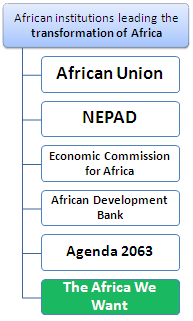
- African Union
- AUDA-NEPAD
- Economic Commission for Africa
- African Development Bank
- Agenda 2063 “The Africa We Want” (AU)
Sample - Institutions are Leading African Socio-Economic Transformation
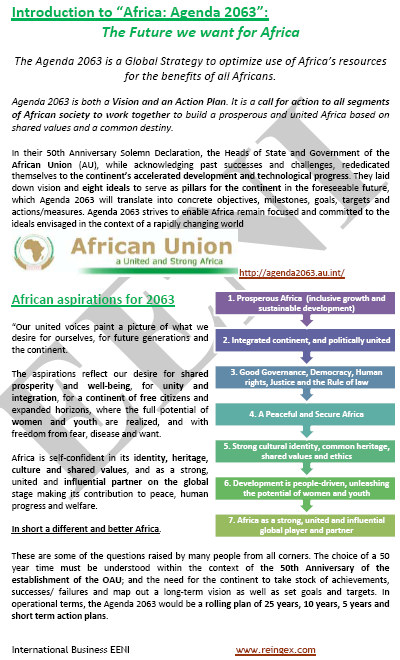


- Credits: 5

- Duration: 1 month It is recommended to dedicate about twelve hours of study per week following a flexible schedule. It is possible to reduce the duration dedicating more hours a week
- Download the syllabus (PDF)
Languages: 
- Also available in For improving international communication skills, student has free access to the learning materials in these languages (free multilingual training).
 Institutions africaines
Institutions africaines  Africa Instituições Transformaçao
Africa Instituições Transformaçao  Africa Instituciones Transformación
Africa Instituciones Transformación
This Training belongs to the following Higher Education Programs offered by EENI:
Master in Business in Africa, Transport and Logistics in Africa.
Doctorate in African Business.

The main objective is to understand the role of...
- The African Union (AU): The “Political Vision: a United Africa”
- AUDA-NEPAD: The “executing agency” of the African Union
- The Economic Commission for Africa (ECA): organises all information necessary to achieve African Integration
- The African Development Bank: Financing the AU vision
Finally, we will study the “Agenda 2063: The future we want for Africa” a key document to understanding the vision of the African leaders.
Training intended for all those wishing to understand African Socio-economic Transformation.
The Subject - Agenda 2063: “The Future we want for Africa.” Syllabus:
- Vision and Priorities of the Agenda 2063
- African aspirations for 2063
- Wealthy Africa (inclusive growth and sustainable development)
- Integrated Continent
- Good Governance, Democracy, Human Rights, Justice and the Rule of Law
- A Peaceful and Secure Africa: “By 2020 all guns will be silent”
- Strong cultural identity, common heritage, shared values and ethics
- Development is people-driven, unleashing women and youth potential
- Africa as a strong, united and influential global player and partner
- Roadmap of the Agenda 2063
- Factors for African Transformation
Sample: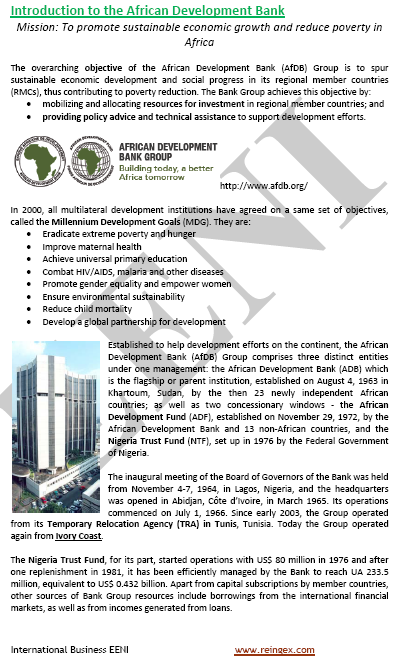
While this goal is very complex (e.g., intra-African trade represents only 10% of total African trade) and will require substantial investments (especially in infrastructure); they are taking decisive steps to achieve it.
Some people are talking about “Africa as an emerging continent.” Although we believe it is premature to consider the African continent as an emerging market (although many African countries are already emerging economies, in fact, South Africa is a BRICS Country), rather we can affirm that Africa is the next “frontier market.”
To achieve this vision of a “United Africa”, four African institutions are playing a fundamental role.
- The “African Union” establishes the political vision
- The NEPAD is the executing agency of the African Union
- The Economic Commission for Africa (United Nations) is the responsible, among other things, to organize all the information necessary to achieve the African Integration
- The African Development Bank is primarily responsible for financing and supporting the development projects in Africa
The African Union has agreed the “Agenda 2063: The future we want for Africa” an essential document to understand the vision of the African leaders.
Knowing these institutions (*), operations, programs and information they provide is vital to understand the profound transformation taking place in Africa.
(*)
Regional Economic Communities also play a fundamental role (analyzed in another course).
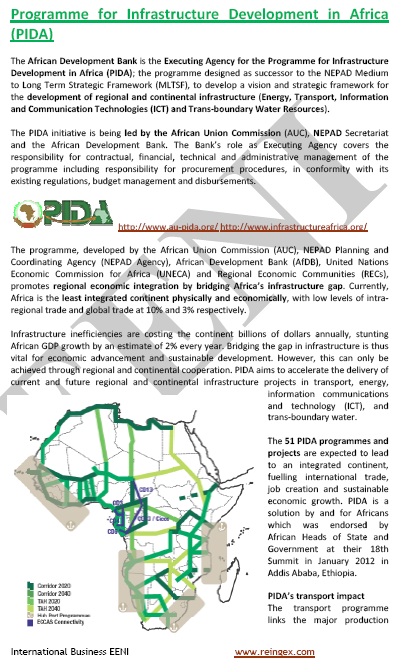
Sample: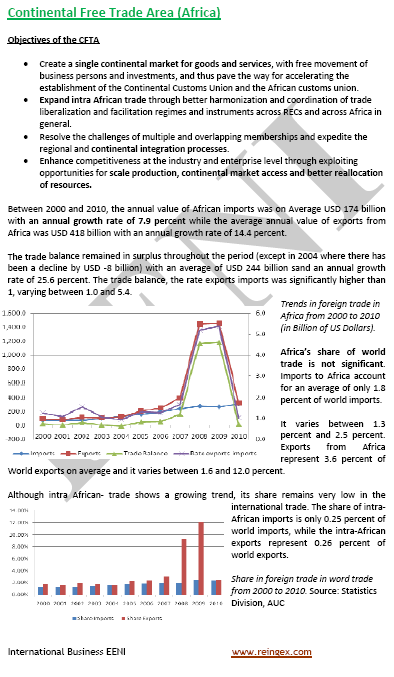
(c) EENI Global Business School (1995-2025)
Top of this page









 WhatsApp
WhatsApp